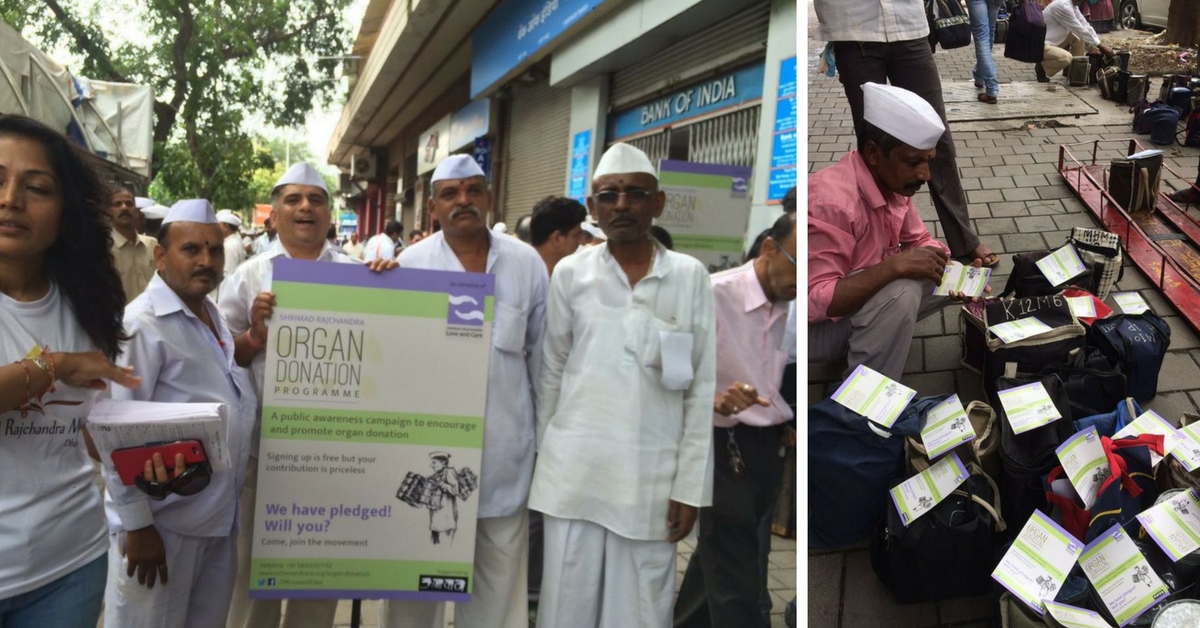The dabbawalas are using tiffin carriers to take the message of organ donation to Mumbaikars, besides pledging to donate their own organs too.
A few months ago we wrote about 7-year-old Deyaan Udani from Australia who tragically lost his life during a holiday in Mumbai. His family decided to donate his organs to four critically ill patients, in accordance with the little boy’s wishes.
Deyaan’s mother said, “Once he asked how he could become an organ donor after seeing my driving licence (in Australia the licence mentions if the person is an organ donor).” After that, he asked to be put on the organ donor list.
This selfless contribution by the Udani family at a time of grief soon evolved into a movement called the Shrimad Rajchandra Organ Donation Programme, a public awareness campaign that encourages and promotes organ donation after death.
Now, the famous dabbawalas of Mumbai have decided to support the Shrimad Rajchandra Organ Donation Programme to promote this cause on the occasion of Organ Donation Day to the people of Mumbai.

About 5000 dabbawalas in the city of Mumbai carry 2 lakh lunchboxes of home cooked meals to offices across the city everyday. They are highly efficient and their reach is immense.
According to Subhash Talekar, spokesperson for the Mumbai Dabbawalas Association, the dabbawalas are carrying organ donation information and cards along with the tiffins to be delivered to clients everyday. In addition, several dabbawalas themselves have signed up to donate their organs after death.
This is probably the largest ever reach that the Shrimad Rajchandra Organ Donation Programme has been able to garner ever since the inception of the project and the dabbawalas are playing a remarkable role in promoting this very necessary humanitarian cause.
“Someone, probably like me, who wants to donate, might do it by reading this and knowing about it. I think it’s a very good initiative,” said Madhur Bhandari, a professional who has lunchboxes delivered to his office daily by dabbawalas, to NDTV.
“Awareness is lacking, there are myths to be shattered. People still believe that they will be disfigured after they die if they donate their organs. This notion must change and it is changing slowly,” added Dr Bijal Mehta, a trustee of Shrimad Rajchandra Love and Care.
Only 0.01 per cent people in India donate their organs after death – an act that can potentially save eight lives and improve the lives of up to 50 people by donating tissues and eyes. It is this lack of information and awareness that the famous dabbawalas of Mumbai are trying to address with the gargantuan effort they have undertaken with such fervour and enthusiasm.
Like this story? Have something to share? Email: contact@thebetterindia.com, or join us on Facebook and Twitter (@thebetterindia). To get positive news on WhatsApp, just send ‘Start’ to 090 2900 3600 via WhatsApp.
If you found our stories insightful, informative, or even just enjoyable, we invite you to consider making a voluntary payment to support the work we do at The Better India. Your contribution helps us continue producing quality content that educates, inspires, and drives positive change.
Choose one of the payment options below for your contribution-
By paying for the stories you value, you directly contribute to sustaining our efforts focused on making a difference in the world. Together, let's ensure that impactful stories continue to be told and shared, enriching lives and communities alike.
Thank you for your support. Here are some frequently asked questions you might find helpful to know why you are contributing?

